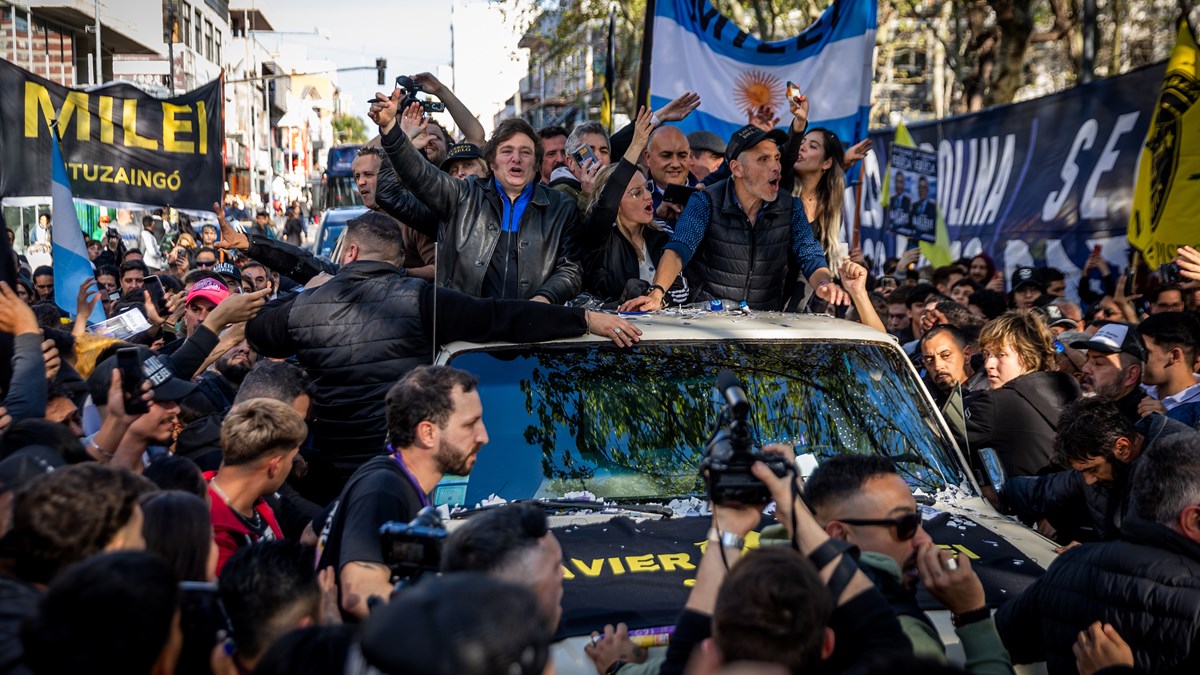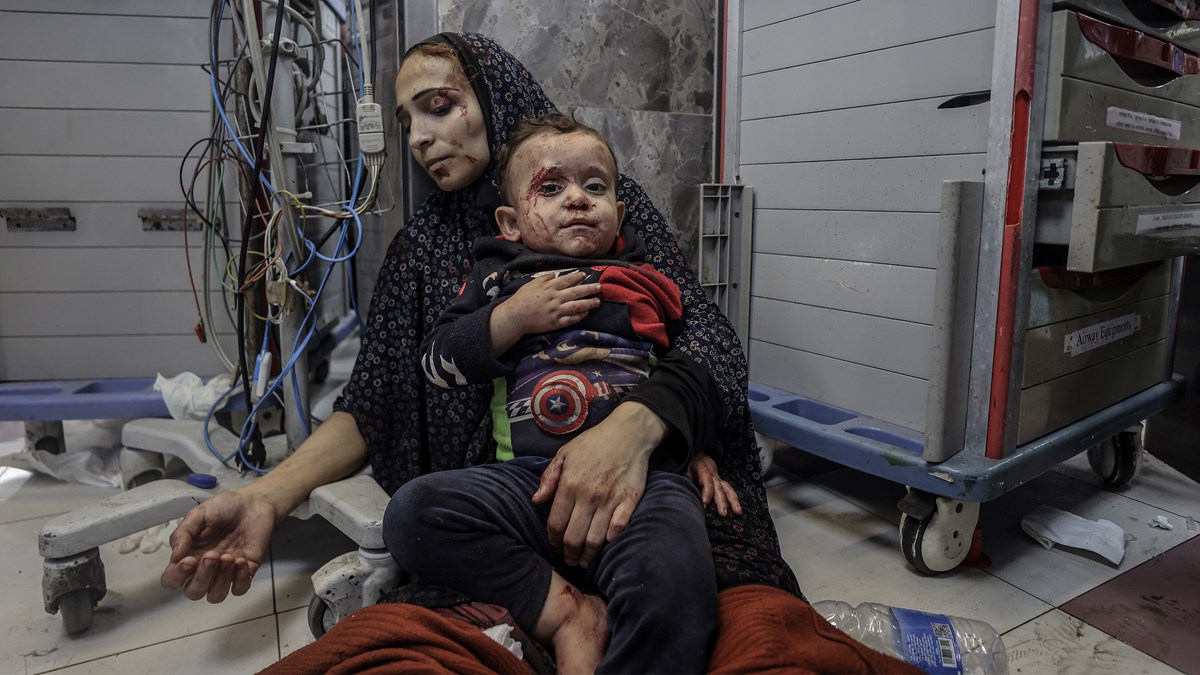SALTA, ARGENTINA—Clutching a yellow flag with a lion’s head, the logo of her favorite presidential candidate, Alicia Ramos rushed to catch a glimpse of the fiery figure she hopes will transform Argentina: Javier Milei, a wild-haired, self-styled libertarian who is currently the country’s presidential front-runner.
Ramos, 29, was one of the hundreds of young people attending a Milei rally in the northern city of Salta, and she remembers the moment she decided to back the unconventional candidate. It was “when he started to speak about dollarization and inflation and, above all, that the country is going to be a liberal country,” she said, referring to Milei’s pledge to replace the country’s currency with the US dollar and use Argentine parlance (liberal) for a more free-market economy.
Ramos, an evangelical, has found that Mileil also shares some of her moral values, mentioning her unhappiness with legislation on gender issues and abortion and the progressive politics of the current Peronist government of President Alberto Fernández and his vice president, former president Cristina Fernández de Kirchner. The National Congress decriminalized abortion in 2020 over strong opposition from evangelicals and Catholics in the pro-life movement; Milei has promised to make the abortion issue a referendum.
“Now is the time for change in the country,” she said. Milei’s publicly stated opposition to abortion, meanwhile, was pushing “many, many people ” in her church to vote for him, she added.
Despite the enthusiasm for Milei that Ramos has experienced at her church, no evangelical voters CT spoke with listed Milei’s perspective on abortion as the reason they’d support him. Instead, heading into Sunday’s elections, the attention of evangelicals, like many of their fellow Argentines, seems focused on electing whoever they believe can best fix their economy, cut corruption, and rebuke the ruling elite.
Millions of Argentines are flocking to Milei, the eccentric anarcho-capitalist economist who promises radical change in the resource-rich South American country beset by recurring economic calamities.
In a surprise victory in the August primary elections, Mileil bested candidates from the two main coalitions: Sergio Massa with the ruling Peronist alliance known as Unión por la Patria and Patricia Bullrich of the conservative-leaning Juntos por el Cambio coalition.
Milei hopes to repeat the strong performance in the October 22 election, advancing to a runoff scheduled for November 19—if not winning outright in the first round.
Famed for his mop of shaggy hair, thick sideburns, and vituperative speaking style, Milei cuts a controversial and unconventional figure in Argentine politics and public life.
For the past two decades, Argentine politics has been dominated by Peronism—the political movement founded by former president Juan Domingo Perón, who governed from 1946 to 1955 and briefly again in the 1970s. (President Mauricio Macri led the Juntos por el Cambio coalition to power in 2015 but was voted out of office four years later having failed to turn around a flailing economy.)
Spending soared under Peronist rule with an expansion of state services and social welfare payments, which critics decried as the formation of patronage groups, as the country recovered from a painful default in 2001. But inflation climbed—then soared—while the currency devalued consistently.
Peronism also more recently included a push toward progressive social issues such as gender ideology and an embrace of the burgeoning feminist movement—which took to the streets in a movement known as the Green Wave (for the green handkerchiefs waved by supporters) to demand an end to harassment and femicides and the decriminalization of abortion.
Milei speaks in hyperbolic outbursts, railing against the “casta” (the political caste) and capitalizing on a deep discontent with corruption in the country’s political class and recurring economic crises in a country with inflation touching 138 percent and poverty afflicting 40 percent of the population. He campaigned with a chainsaw to illustrate his seriousness in slashing spending.
“Politicians are going to say what they think people want to hear. Javier Milei says exactly what he’s thinking,” said Martha Rodríguez, a church leader and pro-life activist in suburban Buenos Aires.
That candor includes the abortion issue, which has drawn enormous interest as Milei identifies as libertarian. Last month, Milei explained to The Economist how his pro-life position could square with his stated libertarian ideals.
“It is based on a philosophical question, which has to do with the right to life,” he said. “Life is a continuum that begins with the moment of fertilization and ends when you die, and any discrete leap in the middle means you died.”
He continued, “For me, abortion is qualified murder aggravated by the bond. Because it is true that the mother has the right over her body, but not over the body of the child, which is a totally different body; it has a different DNA. Therefore, you have the right over your own body, but not over the right of the unborn child.”
But hot-button social issues seldom influence votes in Argentina, according to pastors and political analysts interviewed by Christianity Today. How much the abortion issue influences the 2023 elections remains a matter of dispute.
In a poll surveying evangelical opinion conducted several weeks ago, some 44 percent of respondents said they would vote for Milei.
“[Abortion], basically is the issue that has most seduced evangelicals, when it comes to Milei, even more than his economic ideas and his comments about the political caste, (although this is generally one of the main reasons voters like him),” said Damián Sileo, an evangelical journalist who oversaw the poll.
“I don’t know if the pro-life position is going to matter much at this time,” Rodríguez said. She pointed to the voices she hears at a soup kitchen run by her church, which serves 400 people daily.
“What’s going to matter is the issue of corruption,” she explained. “We have a government that over the past 20 years has left us in deep poverty.”
Other church leaders in Argentina express similar skepticism, noting evangelicals have not been politically organized—unlike neighboring Brazil—and Christians of all denominations have a history of supporting parties across the political spectrum.
“It’s an argument that some evangelical candidates use to attract votes, but the truth is the people are not going to pick a politician because they’re for or against abortion,” said Norberto Saracco, the senior pastor of Iglesia Buenas Nuevas (Good News Church) in Buenos Aires.
“Obviously a lot of people are going to vote on the abortion issue,” said Christian Hooft, director of ACIERA (Alianza Cristiana de las Iglesias Evangélicas de la Republica de Argentina or the Christian Alliance of Evangelical Churches of the Republic of Argentina).
“But that doesn’t mean he’s going to take the evangelical vote,” he added. “People don’t only vote on the abortion issue.”
Two of the main presidential candidates—Massa and Bullrich—met with ACIERA. Milei declined the meeting. But a person affiliated with his La Libertad Avanza movement insisted evangelicals were backing his candidacy.
“I see a lot of Christians who are supporting Javier Milei, mainly because he’s the only one really defending their interests and is not embarrassed to believe in God,” said Eugenia Rolón, an evangelical influencer and volunteer member of Milei’s social media team.
“I think any person who calls themselves Christian should support Javier Milei because he’s the only candidate with a public position who cites the Bible, who is against abortion, against gender ideology, against cultural Marxism, and against the 2030 agenda,” she added.
Many evangelicals mobilized during the 2010s and took to the streets, waving blue handkerchiefs emblazoned with the words Salvemos las dos vidas (“Let’s save two lives”) as the abortion decriminalization debate entered Congress. Decriminalization was narrowly defeated in 2018, but in December 2020, the legislature approved a measure allowing abortion during the first 14 weeks of pregnancy.
Since then, “the intensity of the struggle is less,” Ana Valoy, a pastor and political analyst from the northern city of Tucumán, said of the current situation. “People have become discouraged, and it’s understandable because they see progressive legislation advancing,” she added. “[Those of us more involved in the process] aren’t discouraged; rather, we’re committed to continue working.”
Still, some observers say the evangelical vote could sway a close election—something that could unfold on Sunday. Just three points separated the top three candidates in the August primary.
Evangelicals comprise 15.3 percent of the population, according to a 2019 study—up from 9 percent in 2008. (Argentina doesn’t collect census data on religious affiliation.) However, the number of nonbelievers is swelling even faster, with nearly 19 percent of Argentines now professing no religious affiliation.
Milei, like many in Argentina, grew up Catholic, though he has blasted Pope Francis, a fellow Argentine, as a “disgusting leftist” with “an affinity for murderous communists.” He also criticized the pope for defending “social justice”—a concept commonly spoken of in Argentina, especially among Peronist supporters who point to free education and health care as national achievements.
Rather than Christianity, Milei has embraced Judaism in recent years and recently compared his sister and close adviser, Karina Milei, to Moses and himself to Aaron.
“Moses was a great leader, but he was not good at spreading the word,” he said. “And then God sent Aaron to spread the word. Well, Kari is Moses and I am the one who spreads it.”




























![[Video] More – Aghogho » GospelHotspot](https://gospelhotspot.net/wp-content/uploads/2024/04/More-Aghogho.jpeg)
















